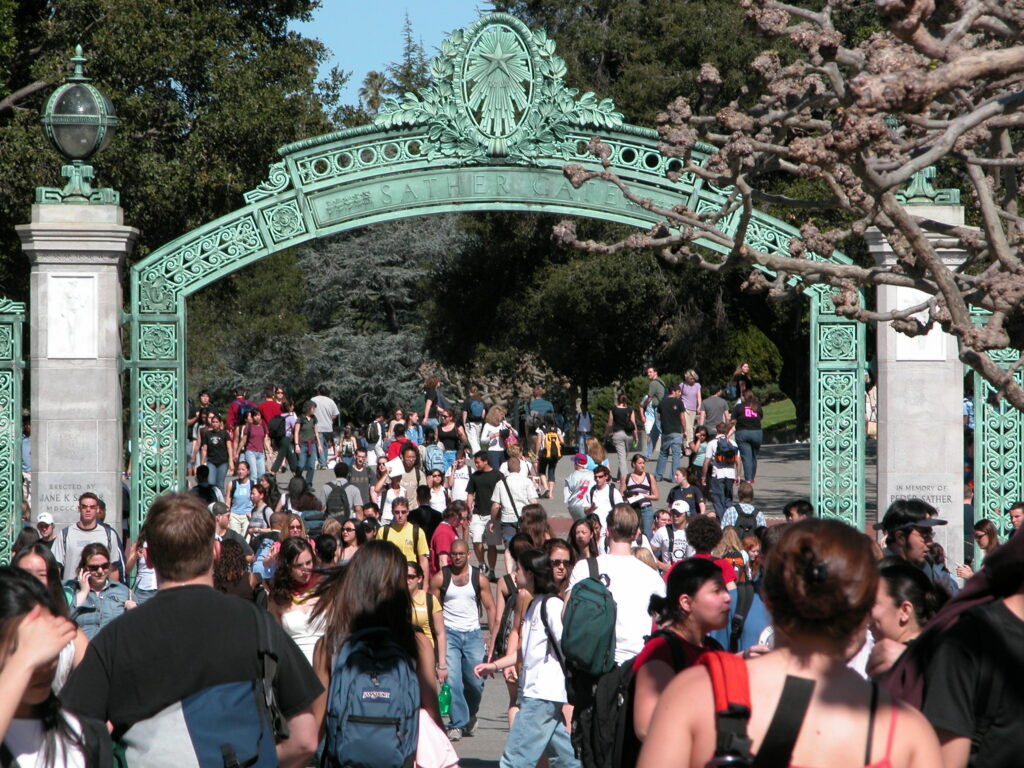
Students pass beneath Sather Gate and onto Sproul Plaza at UC Berkeley.
Credit: Steve McConnell / UC Berkeley
As a student of Mexican, Guatemalan and Salvadoran heritage at UC Berkeley, adjusting to life at a prestigious institution has been hard. Too often, my peers assume stereotypes about me and my parents — that I must have grown up poor, that my parents don’t have an education or speak English, that I must be loud and aggressive like the Latinos they see on TV. Sometimes, while walking on campus, I overhear conversations about the need to deport so-called “illegals.” Whenever professors mispronounce my name, it sounds like nails on a chalkboard to me.
Three years ago, I joined Mariachi Luz de Oro. For myself and student mariachis everywhere, our performance is a rejection of this kind of mistreatment and simultaneously a celebration of our heritage.
Today, student mariachis across the state persevere and celebrate Mexican culture at a time when it is being targeted by the Trump administration. The need for cultural preservation among young Latinos is more timely than ever.
Growing up, I was always on stage. But nothing ever stuck. From ballet at the age of 5 to piano at 9 to theater at 13 and even a cover band at 17, I eventually lost interest in every performing art I was involved in.
But as a college freshman in 2022, I finally found one that stuck — mariachi.

In California, Latino students are more likely to have cultural ties to mariachi music. According to the Public Policy Institute of California, Latinos make up 40% of California’s population and 51.4% of Californians aged 24 years and younger. Mariachi programs help students achieve high levels of musicianship while also helping them stay connected to their culture, unlike music programs derived from European tradition, such as classical music or marching band.
This is why I have continued mariachi. No other art form has mattered to me in a way that also speaks to my roots, from preserving the language to being able to sing songs at family events like funerals and weddings.
When I first found Mariachi Luz de Oro, I’d just moved 400 miles away from Gardena in Southern California, the only home I’d ever known. I remember calling my family and then crying once we hung up because I longed to be home so badly.
Mariachi helped cure that. It gave me a community, a learning space and a newfound sense of closeness with my family. I’ll never forget how excited my grandma was to give me a crochet vihuela pin she made for me to wear on my traje de charro, the mariachi uniform. Homemade videos of me performing and singing in Spanish help my parents miss me a little less.
When I first saw Mariachi Luz de Oro perform, I was volunteering at a local Latino community event. The violins swelled, and the trumpets blared as the singer’s Spanish lyrics resonated in my ears. I knew then and there that this was something I wanted to be a part of.
To my surprise, the group offered to lend me a spare vihuela, an instrument similar to a guitar, but smaller. I hadn’t heard of a vihuela before, nor did I know how to play it or any other mariachi instrument. Even though I had no experience, I felt that this was something I needed to do. That day, amidst the chaos of adjusting to my first semester of college, I decided to pick up a brand-new instrument.
Today, I play and sing at nearly every performance we have. I am a member of the student board and helped organize this year’s third annual UC Berkeley Mariachi Conference.
The conference is a weekend-long event that started in 2023. More than 100 student mariachis from various middle schools, high schools and colleges across California are invited to campus. They get to perform in a showcase, build community, and participate in two days of classes taught by world-class mariachi instructors.
Through the UC Berkeley conference, I have met many inspirational student mariachis, including Karen Orozco, a senior at Garfield High School in East Los Angeles, who said that her participation in mariachi in high school prepared her for success. Orozco balances being a guitarist for the school’s mariachi group, Mariachi Los Alanos, and its all-girl group, Mariachi Las Mariposas. Orozco said that most mariachi members at her school plan to attend college and continue playing mariachi music.
“It’s helped us see how much we can achieve,” Orozco said. “It gives us motivation in both academics and performing.”
Orozco and I can both attest to the importance of mariachi programs. Although mariachi has taken a lot of hard work and time, I don’t have any regrets. It has helped me along my academic journey, while keeping me connected to my family and heritage at a time when keeping mariachi music alive is more important than ever.
•••
Daniela Castillo is student at UC Berkeley majoring in media studies with a concentration in global and cultural studies, as well as a double minor in journalism and ethnic studies, and a member of EdSource’s California Student Journalism Corps.
The opinions expressed in this commentary represent those of the author. EdSource welcomes commentaries representing diverse points of view. If you would like to submit a commentary, please review our guidelines and contact us.

دیدگاهتان را بنویسید